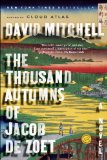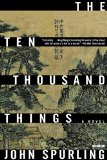Summary | Excerpt | Reading Guide | Reviews | Beyond the book | Read-Alikes | Genres & Themes | Author Bio

A Novel
by David MitchellA magnificent mix of luminous writing, prodigious research, and heedless imagination, The Thousand Autumns of Jacob de Zoet is the most impressive achievement of its eminent author.
In 2007, Time magazine named him one of the most influential novelists in the world. He has twice been short-listed for the Man Booker Prize. The New York Times Book Review called him simply “a genius.” Now David Mitchell lends fresh credence to The Guardian’s claim that “each of his books seems entirely different from that which preceded it.” The Thousand Autumns of Jacob de Zoet is a stunning departure for this brilliant, restless, and wildly ambitious author, a giant leap forward by even his own high standards. A bold and epic novel of a rarely visited point in history, it is a work as exquisitely rendered as it is irresistibly readable.
The year is 1799, the place Dejima in Nagasaki Harbor, the “high-walled, fan-shaped artificial island” that is the Japanese Empire’s single port and sole window onto the world, designed to keep the West at bay; the farthest outpost of the war-ravaged Dutch East Indies Company; and a de facto prison for the dozen foreigners permitted to live and work there. To this place of devious merchants, deceitful interpreters, costly courtesans, earthquakes, and typhoons comes Jacob de Zoet, a devout and resourceful young clerk who has five years in the East to earn a fortune of sufficient size to win the hand of his wealthy fiancée back in Holland.
But Jacob’s original intentions are eclipsed after a chance encounter with Orito Aibagawa, the disfigured daughter of a samurai doctor and midwife to the city’s powerful magistrate. The borders between propriety, profit, and pleasure blur until Jacob finds his vision clouded, one rash promise made and then fatefully broken. The consequences will extend beyond Jacob’s worst imaginings. As one cynical colleague asks, “Who ain’t a gambler in the glorious Orient, with his very life?”
A magnificent mix of luminous writing, prodigious research, and heedless imagination, The Thousand Autumns of Jacob de Zoet is the most impressive achievement of its eminent author.
The Thousand Autumns of Jacob de Zoet is so unbelievably good that as soon as I started reading it, I grew anxious about how to convey its brilliance without resorting to overused words like, well, "brilliance." I'll do my best to produce a discerning review, but all I really want to say is: for the love of story, read this book!..continued
Full Review
 (831 words)
(831 words)
(Reviewed by Amy Reading).
There are two nations with two utterly incommensurate notions of power at loggerheads with each other in The Thousand Autumns of Jacob de Zoet. On the one hand, the Netherlands is represented by the Dutch East Indies Company (Vereenigde Oost-Indische Compagnie or VOC in Dutch), a government-chartered company founded in 1602 to monopolize the Netherlands' trading in Asia. A chartered company allowed its shareholders to pool capital and dilute risk in order to embark on farflung missions. The VOC was the world's first multinational corporation and the first company to issue stock. Its rights far exceeded those of today's multinationals, because it was allowed to wage war, negotiate treaties, coin money, and establish colonies. The ...

If you liked The Thousand Autumns of Jacob de Zoet, try these:

by John Spurling
Published 2015
A novel of fated meetings, grand battles, and riveting drama, and in its seamless fusion of the epic and the intimate, it achieves a truly singular beauty that deserves to be compared to the classic Chinese novels that inspired it.

by Tanis Rideout
Published 2014
"Tell me the story of Everest," she said, a fervent smile sweeping across her face, creasing the corners of her eyes. "Tell me about this mountain that's stealing you away from me."
Experience is not what happens to you; it's what you do with what happens to you
Click Here to find out who said this, as well as discovering other famous literary quotes!